Timor-Leste, a nation with a deep sense of community and resilience, is laying the foundation for its future through its children.
At the heart of this effort are passionate volunteers like Jude de Waal and Maggie Stevenson, whose partner organisation is UNICEF, though their work sees them based at Alola Foundation who have the contract for day-to-day responsibility of the community preschools. They are dedicated VSA volunteers who are transforming early childhood education by sharing their skills, experiences and hearts with the teachers of Timor-Leste.
Together, they are helping shape this generation through play-based learning, with a focus on hands-on teaching that equips teachers to build the future of their communities.
I sat down with Jude and Maggie after their recent annual training to learn more about their motivations, the challenges they’ve faced and their journey as volunteers.
Finding their path to Timor-Leste
For Jude, her journey into early childhood education began almost by accident. Initially hoping to train as a primary teacher, she was guided by a lecturer to enter the early childhood education field. This unexpected path became her calling, leading her to work in preschools before taking a decade-long detour that included being a youth pastor. But it was her volunteer experiences in Africa – working in an orphanage and supporting a preschool – that cemented her passion for development work. Jude had the opportunity to come alongside and invest into teachers in places like Sudan, Mozambique and Cambodia, experiences that shaped her understanding of the importance of early childhood education in underserved communities.
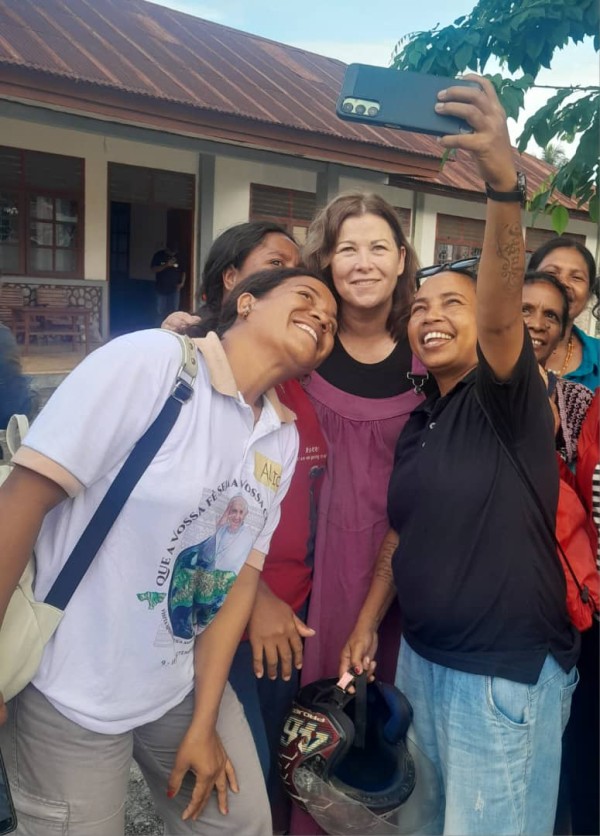
Jude (centre) with local teachers in Viqueque, October 2024.
Similarly, Maggie’s story reflects the power of guidance and life-changing experiences. Initially drawn to developmental needs, her direction shifted when she met someone who inspired her to consider early childhood education. Travel and teacher training in India, Africa and Vietnam, further opened her eyes to the transformative power of education. Her connection with VSA came through her admiration for the work of Sir Edmund Hillary. After applying for a role in Vanuatu in 2015, Maggie’s journey eventually led her to Timor-Leste in 2019, where after a detour home due to COVID-19 and a time spent as an eVol (online volunteer) she has since returned to Timor to continue her work.
Both Jude and Maggie describe how working in less privileged countries changes you. ‘One can’t unsee what they’ve seen,’ says Jude, reflecting on the impact of her work.
The role of early childhood teachers: A team effort
The partnership between Jude and Maggie is a testament to the power of collaboration. Together, they work in two regions – Viqueque and Emera – travelling between the areas to conduct preschool training for their 176 teachers from 87 preschools who between them have 2500+ preschool children. Their approach focuses on ‘cluster training’, where groups of teachers and field officers from nearby schools come together for hands-on learning. This method creates a network of support among educators and ensures the continuation of play-based learning techniques.
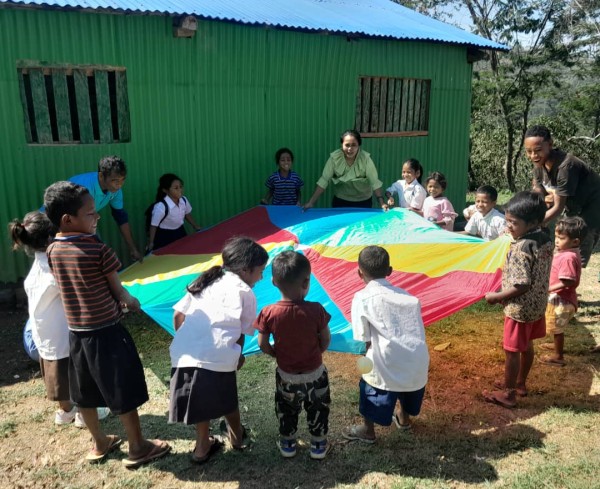
Parachute in action – a feature of play-based learning – at Fatubolu Community Preschool, Emera, October 2024.
While they face challenges – such as poor road conditions, language barriers, heat and the fact that teachers are all volunteers who mostly have school qualifications ranging from end of primary school to end of secondary school – Jude and Maggie have developed a respectful and harmonious working relationship. They balance each other's strengths, complementing one another’s teaching styles while remaining focused on their shared goal: supporting teachers to provide the best education possible for Timor-Leste's youngest citizens.
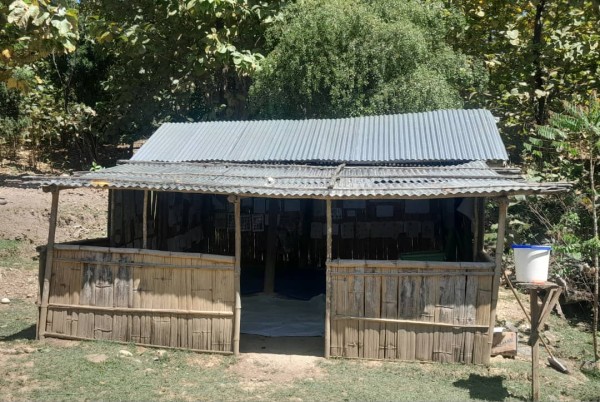
Home-based Manuboe preschool recently built by the community, Viqueque 2024.
Their passion for play-based learning is evident in the way they model it in their training. As Jude explains, ‘We’re not here to turn teachers into Western educators. We’re here to enhance what they already do and add value through a play-based model making use of as many natural resources as possible.’ By demonstrating the effectiveness of these methods in their teacher training, they help teachers engage with their learners in ways that are practical and culturally relevant, and ensure no learner is left behind.
The challenges and joys of volunteering
Like all development work, there are hurdles to overcome. For Jude and Maggie, the language barrier is a constant challenge. While translators are available for all training, their knowledge of early childhood education can vary, which sometimes limits how well ideas are communicated. Despite these difficulties, these volunteers rely on the interactive nature of play-based learning to overcome communication gaps. They also face logistical challenges, such as the long (up to four hours each way) sometimes uncomfortable drives on rough roads to reach preschools in remote areas in both dry and wet season.
As well as the training, a highlight for Maggie has been the opportunity to cultivate and build warm, collegial relationships with the Ministry of Education early childhood teacher trainers. Navigating initial scepticism and forging positive connection and recognition that everyone is working towards the same vision – wanting the best for the children.
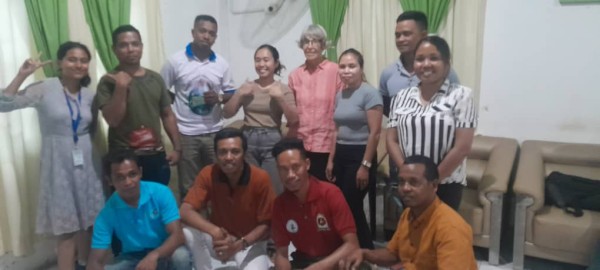
Maggie, centre back, with the Alola ECE team, November 2024.
Yet the joys far outweigh the challenges. A recent highlight was the success of their annual training in Emera, where 89 teachers – representing 500 years of collective experience – came together to learn from each other. The event underscored the importance of collaboration and capacity building, two elements Jude and Maggie foster in all their training sessions.
For Maggie, the little moments and interactions with the local community are what make each day special, such as local children joining her on the beach to search for sea glass. These small, genuine connections bring joy.
Leaving a lasting legacy
As their contracts draw to an end, both Jude and Maggie are reflecting on what comes next. Jude plans to return to Aotearoa to spend the coming summer as carer support for her autistic nephew, which gives an opportunity to reflect on where to next whilst still remaining open to future volunteering opportunities. Maggie too is contemplating further volunteer work.
Jude’s words capture the heart of their mission: ‘We only have one life; find your purpose and do what makes your heart sing.’ For both women, that means giving their time, energy and passion to help Timor-Leste’s children grow into their potential. Whilst their legacy lies in the skills passed onto teachers, they feel blessed to have received so much learning from others who, to those from a developed country might seem to have so little, but they have discovered in many ways they have so much.
One of the newer teachers Jude worked with recently at annual training captured the essence of their mission perfectly when in beautiful English he said, ‘Children are why we do what we do. We are laying the foundation for life and learning, I can see I am building the foundations that our young need.’ This simple yet powerful statement underscored for Jude that her teaching was making a real difference, reinforcing that what she and Maggie were doing truly mattered.
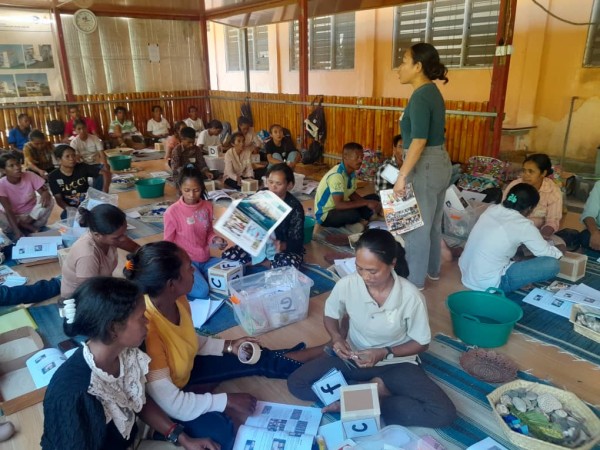
Capacity-building in action. Mana Natalicia, an Alola preschool co-ordinator, is leading a workshop with her new learning at annual training 2024.
The sense of community extended beyond Timor-Leste when Jude received a grant from VSA to provide parachutes for use in play-based learning. As these were unavailable locally, she reached out for help. People in New Zealand and Australia jumped in to support, gathering and sending these play parachutes for the training sessions to be gifted, one to each preschool. Coordinating the delivery of such a large number of supplies via slow internet became a significant mission, but the willingness of people to help was a blessing that Jude doesn’t take for granted. This outpouring of support further cemented the idea that even from afar, people are happy to contribute to development projects.
On a personal level Jude experienced the deep kindness and sense of community in Timor-Leste firsthand. When she was grieving the loss of a friend back in New Zealand, her neighbour noticed that something was wrong and asked, ‘Diak ka lae?’ (meaning ‘good or not?’). In that moment of vulnerability, Jude shared her sadness, and her neighbour embraced and cried with her, offering comfort and care. Similarly, when Jude was sick with chikungunya fever, this same neighbour visited her twice a day, to make sure she was okay. These acts of kindness showed Jude the strength of the Timorese community, a place where people genuinely care for each other, even across cultural and language barriers.
As Jude and Maggie prepare to move on to the next chapters of their lives, they leave behind a solid foundation for the future of early childhood education in rural Timor-Leste—one that will continue to grow, evolve, and guide today’s children for life and learning.
